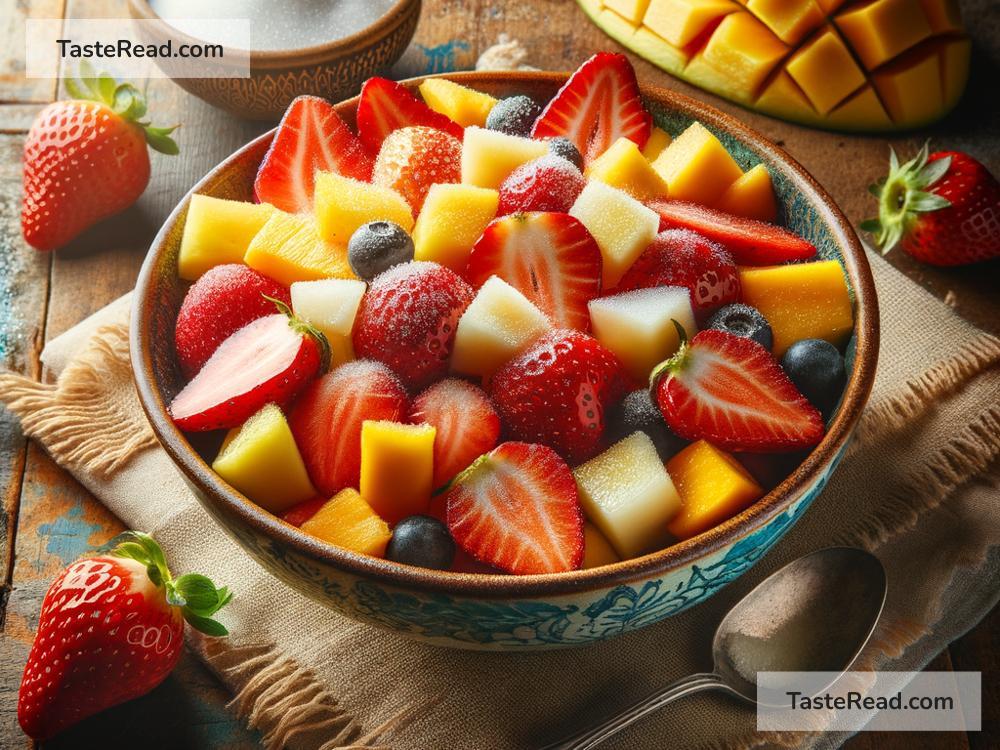Why Fruits Taste Better with Added Sugar
Have you ever noticed how fruits taste even sweeter and juicier when you add a sprinkle of sugar? Whether it’s a juicy strawberry or a tart slice of grapefruit, adding sugar to fruits can seem like a magical trick that brings out the best in their natural flavor. But why does this happen? What is it about sugar that makes fruits taste better? Let’s explore the science and psychology behind this sweet phenomenon!
Fruits Are Naturally Sweet
Fruits are packed with natural sugars, mostly fructose and glucose. These sugars give fruits their delicious sweetness, making them one of nature’s favorite treats. However, not all fruits are created equally when it comes to sweetness. Some fruits, like ripe bananas or peaches, have a higher sugar content, making them naturally sweeter. On the other hand, fruits like lemons, cranberries, or grapefruits tend to have a tart or tangy flavor because they contain less sugar and more acid.
Taste is subjective, and how sweet or sour you find a fruit depends on your own taste buds. For example, some people love biting into a sour green apple, while others might find it too sharp and prefer a sweeter, red apple instead.
Why We Add Sugar to Fruits
Sometimes, fruits can taste too sour or bitter for our liking. This is where adding sugar comes into play—it helps balance the flavors. Sugar has the ability to reduce sourness and bitterness, making the fruit taste more appealing. It enhances the natural sweetness of the fruit and gives our taste buds a pleasant experience.
For example, think about a bowl of sliced strawberries. If the strawberries aren’t fully ripe, they might taste slightly tangy or bland. Adding a teaspoon of sugar not only sweetens them but also helps accentuate their fruity aroma and flavor. The sugar works as a “flavor enhancer,” making the strawberries taste brighter and more delicious.
The Science Behind It
The reason added sugar improves the taste of fruits is deeply rooted in how our taste buds work. Our tongues have five main taste receptors: sweet, sour, salty, bitter, and umami. When you eat a piece of fruit, your taste buds pick up on these flavors, and your brain interprets the taste.
Sugar directly stimulates the sweet receptors on your tongue. When sweetness increases, it often overshadows the sour or bitter notes in the fruit. For example, if you sprinkle sugar on a slice of grapefruit, you’ll notice that it becomes less tangy and more enjoyable to eat. This happens because sugar is masking or neutralizing some of the acidic flavors found in the grapefruit.
Additionally, sugar can amplify certain fruity compounds in the fruit, making the overall flavor seem stronger and more vibrant.
The Psychological Aspect of Sweetness
Another reason why fruits taste better with added sugar is tied to psychology. As humans, we’re naturally drawn to sweetness because our bodies associate it with energy. The sugars in food provide calories, which are a source of fuel for our bodies. From an evolutionary standpoint, our ancestors preferred sweet foods because they were often linked to safety (sweet means ripe, while bitter could mean poisonous). So, when we eat sweetened fruit, it triggers a sense of satisfaction and enjoyment.
This explains why desserts—such as fruit salads, pies, or jams—are so popular. They combine the natural sweetness of fruits with added sugar to create a comforting and indulgent experience.
Is Adding Sugar to Fruits Healthy?
While added sugar makes fruits taste better, it’s important to use it in moderation. Fruits are already nutritious—they provide vitamins, minerals, fiber, and antioxidants that support your health. But if you add too much sugar, you could end up consuming extra calories and potentially harm your health over time. Excessive sugar can lead to issues like weight gain, dental problems, and an increased risk of diseases such as diabetes.
If you want to enjoy the sweetness of fruit without too much added sugar, try using honey or natural sweeteners as healthier alternatives. Another tip is to choose fruits that are in season—they’re usually ripe and taste sweeter naturally, so you won’t feel the need to add extra sugar.
Alternatives to Added Sugar
If you’re trying to enjoy fruit without relying too much on added sugar, there are plenty of other ways to enhance their flavor. For instance, try sprinkling a little cinnamon or nutmeg on fruits like apples and pears. A squeeze of fresh lemon or lime juice can also brighten the taste of fruits while adding a zesty twist. Yogurt, nuts, or a drizzle of honey can turn plain fruit into a healthy, flavorful snack.
You can also experiment with roasting or grilling fruits like peaches, pineapple, or mango. The heat caramelizes their natural sugars, giving them a rich, sweet taste without needing to add extra sugar.
Conclusion
In summary, fruits taste better with added sugar because sugar balances sourness, enhances natural sweetness, and even boosts fruity flavors. It’s a combination of science and psychology—our taste buds love sweetness, and our brains associate it with pleasure. However, it’s always a good idea to enjoy fruit’s natural flavor and use added sugar sparingly.
So the next time you sprinkle a little sugar on your strawberries, remember that there’s both science and history behind why it tastes so good. Just don’t forget: moderation is key for a healthy, happy lifestyle!


